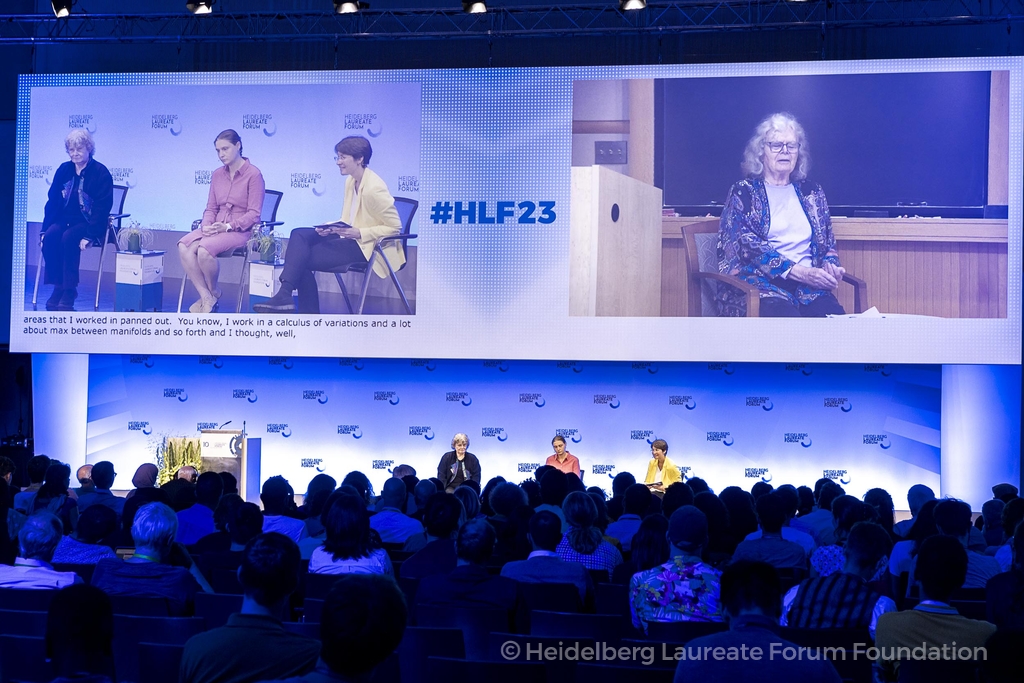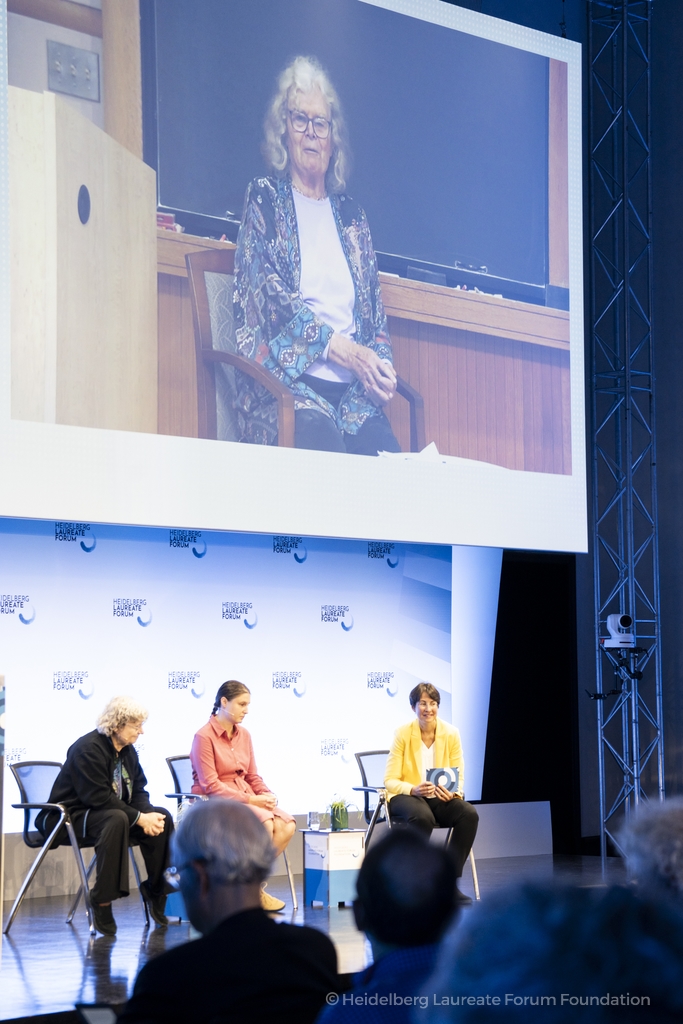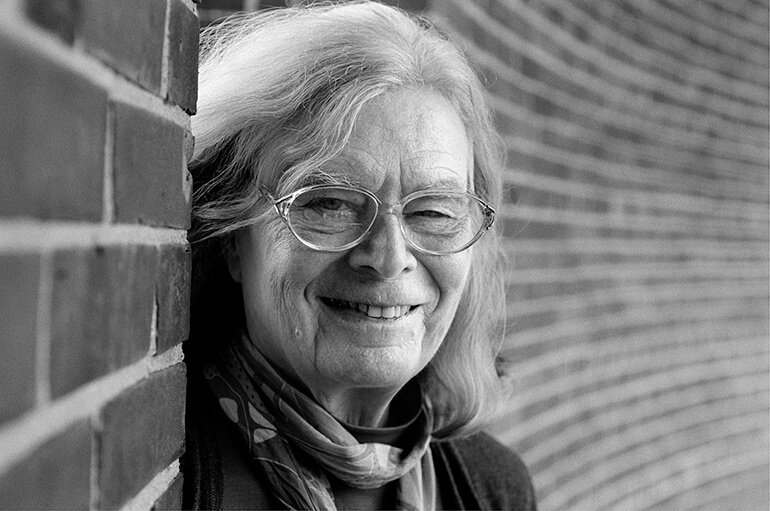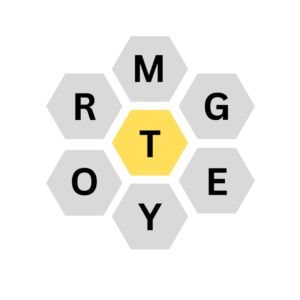A Conversation with Karen Uhlenbeck
BLOG: Heidelberg Laureate Forum

It was the second day of the 10th Heidelberg Laureate Forum (HLF) in September 2023 and I was sat nervously in my hotel room. Karen Uhlenbeck, while not attending the Forum in person, was to be on a panel at the Forum the next day, together with noted mathematician Ingrid Daubechies and Fields Medallist Maryna Viasovska. Uhlenbeck is most famous for being the first woman to win the prestigious Abel Prize, but her mathematical successes extend far beyond this. Uhlenbeck is also a mathematician that I have admired for a long time, and very soon, I was going to speak with her.
I took a deep breath. Then I joined the Zoom call.
It very soon became clear that I need not have worried. Karen Uhlenbeck is a brilliant woman but what’s more, she is delightfully normal. The next day, at the panel discussion, Ingrid Daubechies would confess to Uhlenbeck how meeting her was a high point in her life. “Not only did you really exist and were real but you were wonderful,” Daubechies said. I could not agree more.
From Physics to Mathematics
Karen Uhlenbeck’s career is full of prestige and acclaim. She was awarded the National Medal of Science in 2000 and received the Leroy P. Steele Prize for Seminal Contribution to Research of the American Mathematical Society in 2007. She became an honorary member of the London Mathematical Society in 2008 and a Fellow of the American Mathematical Society in 2012 – and this is only a small selection of her accolades.
You would be forgiven for thinking, given her success, that Uhlenbeck was following a plan. This could not be further from the truth. “I just wander around and when something catches my eye, I work on it,” Uhlenbeck told young researchers during her panel discussion. She confessed that she does not always choose wisely, but stressed the importance of making sure that the problems you choose to tackle are ones that genuinely interest you, not just your supervisor: “Getting problems that are the right fit for one’s imagination is the important step.”
Finding what fitted her imagination was not a simple process for Uhlenbeck. She intended to major in physics when she enrolled at the University of Michigan. It was during her second semester, when attendance started to be taken in lectures, that she started to consider a change. She had also been finding the lab work – and her lab partners –challenging.
Around that time, Uhlenbeck met Daniel Hughes, a finite geometer and group theorist. Hughes (or “Dan” as he was known to Karen), took her under his wing. By the end of her second year, Uhlenbeck was grading linear algebra papers. It was immediately obvious that mathematics was something she was very good at.
Following her time in Michigan, Uhlenbeck attended graduate school, taught at MIT for a year, and then taught at Berkley for another two. She held faculty positions at various universities in the state of Illinois from 1981 to 1988, before making her final move to the University of Texas in Austin. Following her retirement, she moved to Princeton where, in 2019, she became a Distinguished Visiting Professor at the Institute for Advanced Study.
I asked Karen if she had any regrets regarding her mathematical career. “I wish I had recruited more students and post docs to work with me at the University of Texas,” she replied. “In a similar vein, I wish I had advertised my students’ work more aggressively. I tended to take things as they came and left my students to fend for themselves once they completed theses.”
Any researcher aiming for a long-term career in mathematics has hoops to jump through. Uhlenbeck stresses the importance of holding on to the enjoyment of maths. “Don’t let it get to you or embitter you,” she told the young researchers during her panel at the HLF. “It’s very important to keep your soul.” In fact, one of Uhlenbeck’s greatest assets is her ability to not let the external world get to her. “I judge myself,” she replied when a young researcher at the HLF asked her how she deals with imposter syndrome. Her validation comes first and foremost from within.
The Founder of Geometric Analysis

Karen Uhlenbeck was awarded the Abel Prize in 2019 in recognition of her “pioneering achievements in geometric partial differential equations, gauge theory and integrable systems, and for the fundamental impact of her work on analysis, geometry and mathematical physics.” The citation is not exaggerating when describing her contributions as fundamental – Uhlenbeck is a founder of modern geometric analysis, and made great strides in Yang-Mills theory as well.
Geometric analysis describes both the application of geometric methods to differential equations, and the use of tools from differential equations to solve problems in differential geometry and differential topology. Geometric analysis’ breadth means it can lead to a wide variety of results in both mathematics and physics.
Gauge theory is a subfield of geometric analysis, studying fields in which a certain function known as the Lagrangian does not change following the application of a particular type of smooth operator (known as a Lie Group). If this seems difficult, it’s because it is! Uhlenbeck studied gauge theory extensively, in particular working with Yang-Mills theory, which focusses on a specific type of Lie Group. Yang-Mills theory is a key piece of the jigsaw of unifying the electromagnetic force and the weak force. It searches for a theory of quantum gravity and plays a vital role in our understanding of the Standard Model of particle physics. Karen Uhlenbeck’s work analysing the Yang-Mills equations in four dimensions inspired many breakthroughs from other mathematicians and eventually led to the work for which Simon Donaldson won the Fields Medal in 1986.
A major unsolved problem of Yang-Mills theory is the Yang-Mills existence and mass gap problem. This is one of the seven problems chosen by the Clay Mathematics Institute in 2000 to form their “Millennium Problems”, with a $1 million reward promised to the solvers of each problem.
The Yang-Mills existence and mass gap problem is not the only one of the Millennium problems that appears to be amenable to geometric analytic techniques. Grigori Perelman’s work in geometric analysis, specifically on Ricci Flow, resulted in a solution to the Poincaré Conjecture. At the time of writing, in 2023, the Poincaré Conjecture is the only one of the problems to have been solved. Grigori Perelman refused the money.
Despite this incredible work, Uhlenbeck’s favourite result is her work on regularity of elliptic systems, published in 1976. Uhlenbeck explained to me that “It might be my most technical and difficult paper. It proved to me that I was a good mathematician.” She worked on the paper immediately after graduate school, spending five or six years on it. At the time, relations between the USA and Soviet Russia were poor, impacting the flow of ideas, so Uhlenbeck was unaware until many years later that the same problem had been solved by Nina Uraltseva in 1972. Upon hearing the news though, Karen Uhlenbeck was pleased: “She was one of my heroes as a graduate student.”
A Champion for Women in Maths

Something Karen Uhlenbeck and I have in common is that we are both huge proponents of women in maths. Uhlenbeck feels a huge responsibility towards other women in mathematics and has spent large parts of her career encouraging others. In her current position, she has organised monthly lunches for female mathematicians to introduce them to ideas from different fields. She has also long been engaged with organisations such as the Association for Women in Mathematics. Uhlenbeck even donated half of her Abel Prize money to the promotion of minorities in mathematics, splitting it between the EDGE Foundation, and the Institute for Advanced Study.
Uhlenbeck describes her early career as being like the film Oppenheimer – “all men, cigarettes and alcohol.” When asked why she succeeded in such a male-dominated world, while many other women did not, she is stumped. “I don’t really have any idea how I did it.” Uhlenbeck states that she does not believe she was smarter or “more savvy” than other women.
She is similarly uncertain of how to encourage women in mathematics in the future, especially in a genuine and helpful way. She describes how upon meeting young female mathematicians, she immediately thinks she should help them. Even as a woman, she confessed that she immediately assumes that men are brilliant and women are struggling. “This is actually a form of prejudice,” Uhlenbeck acknowledges. “These are brilliant mathematicians I should be excited to meet.” She says she has spent the last 30 years of her career trying to encourage women. Now, Uhlenbeck realises, she needs to sit back and admire them.
Uhlenbeck is optimistic about the future, too. She has noticed the attitudes towards women in maths, and that the environments of maths departments have slowly been changing. She does point out that, as women had not been part of the intellectual world for 4000 years, it will take more than a couple of decades to change that.
Whilst at HLF, I found myself in several conversations about the lack of female Fields Medallists. One repeated discussion was how capping the age of those eligible to receive the medal at 40 precludes almost all women who become mothers. Uhlenbeck herself does not have children, but she tells me that this was not her choice “I was sad that I was not able to get pregnant, at a time when there were not easy medical procedures to help solve the problem.”
I am touched and moved by her honesty and openness. I had not directly asked about children, but Uhlenbeck gave a strong impression of wanting to talk about it. “It is understandable that no one asks me why I did not have children. It must be a common unspoken question. I am not the only woman in history with this story.” In many ways, maths became a solace to Uhlenbeck, going some way to fill the gap that she had hoped children would fill: “[It] would have left my life empty if I hadn’t had mathematics to fill it.”
A Puzzle Champion
Uhlenbeck and I spoke in depth about her life and career, but there was still time to chat about her hobbies. It didn’t take long for us to discover our shared love for the New York Times Spelling Bee puzzle – a puzzle where you must make as many words as you can with the seven letters you are given. Letters can be used more than once, but each word must contain the central, yellow letter. Uhlenbeck enjoys the challenge and explained that feeling of satisfaction after finding a word containing all seven letters is much like how she feels after solving a particularly difficult mathematics question.
Over the course of her career, Uhlenbeck has come across many problems that have taken her years to solve. Rather than this being discouraging, she relishes the challenges. She described to me the comfort in returning to the same problem again, revisiting previous chains of thinking and prying out new ideas. In fact, she said she often felt disappointed when she finally did crack the puzzle. “I like to work on problems that are hard and take a long time and there’s always a bit of sadness when I solve them.”
Unfortunately for me, it was now my turn to feel a bit of sadness as my chat with Karen Uhlenbeck was nearly over. I wish I had had longer to speak with her, and I wish the Zoom call had not cut out. But despite the brevity of our conversation, it was clear what a brilliant person she is. Yes, brilliant in the sense of her mathematical achievements, but also brilliant in her generosity and in her humility. They say to never meet your heroes. Thankfully, Karen Uhlenbeck proves that adage wrong.




Fantastic article. She sounds like an amazing person, warm, caring and brilliant.
Wie verlief die Begegnung mit Karen Uhlenbeck während des 10. Heidelberg Laureate Forum im September 2023? Was wurde in der Panel-Diskussion mit Uhlenbeck, Ingrid Daubechies und Maryna Viasovska besprochen?
Tel U